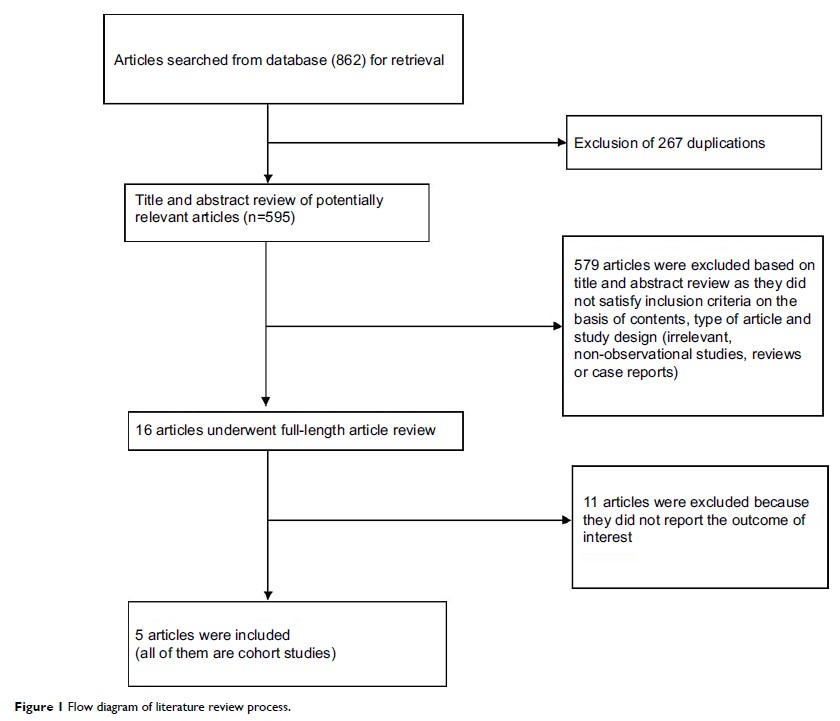108899
论文已发表
注册即可获取德孚的最新动态
IF 收录期刊
- 3.4 Breast Cancer (Dove Med Press)
- 3.2 Clin Epidemiol
- 2.6 Cancer Manag Res
- 2.9 Infect Drug Resist
- 3.7 Clin Interv Aging
- 5.1 Drug Des Dev Ther
- 3.1 Int J Chronic Obstr
- 6.6 Int J Nanomed
- 2.6 Int J Women's Health
- 2.9 Neuropsych Dis Treat
- 2.8 OncoTargets Ther
- 2.0 Patient Prefer Adher
- 2.2 Ther Clin Risk Manag
- 2.5 J Pain Res
- 3.0 Diabet Metab Synd Ob
- 3.2 Psychol Res Behav Ma
- 3.4 Nat Sci Sleep
- 1.8 Pharmgenomics Pers Med
- 2.0 Risk Manag Healthc Policy
- 4.1 J Inflamm Res
- 2.0 Int J Gen Med
- 3.4 J Hepatocell Carcinoma
- 3.0 J Asthma Allergy
- 2.2 Clin Cosmet Investig Dermatol
- 2.4 J Multidiscip Healthc

心肌梗死后癌症风险增加:事实还是虚构?一个系统评价和综合分析
Authors Li N, Huang Z, Zhang Y, Sun H, Wang J, Zhao J
Received 6 November 2018
Accepted for publication 27 January 2019
Published 1 March 2019 Volume 2019:11 Pages 1959—1968
DOI https://doi.org/10.2147/CMAR.S193658
Checked for plagiarism Yes
Review by Single-blind
Peer reviewers approved by Dr Colin Mak
Peer reviewer comments 2
Editor who approved publication: Dr Chien-Feng Li
Objective: Accumulating
evidences showed some positive relations between myocardial infarction (MI) and
new onset cancer. We aim to investigate whether MI is associated with an
increased risk of incident cancer.
Methods: A comprehensive
literature list was identified from MEDLINE, Embase, and Web of Science
databases from inception until October 2018. The main inclusion criteria
included observational studies investigating the association between MI and new
onset cancer. Stata 12.0 software was used for meta-analysis.
Results: Of 862
potentially relevant studies, five cohort studies met all inclusion criteria.
The pooled cancer incidence rate was 9.5% (95% CI=8.3–10.7%). Pooled analysis
of OR showed that the increased overall cancer risk in MI patients in
comparison with controls had no statistical significance (OR=1.08; 95%
CI=0.97–1.19, P =0.153). Subgroup analysis by gender demonstrated
that the overall cancer risk was only significantly increased in female
(OR=1.10; 95% CI=1.01–1.20, P =0.025), but not in male patients (OR=1.04; 95%
CI=0.99–1.10, P =0.124). In terms of cancer type, the increased
cancer risk was only significant for lung cancer (male OR=1.12; 95%
CI=1.05–1.19, P <0.01; and female OR=1.51; 95% CI=1.15–1.99, P <0.01), but not
for prostate (OR=0.96; 95% CI=0.85–1.09, P =0.546) or breast
cancer (OR=0.94; 95% CI=0.86–1.04, P =0.222). In addition, the increased cancer risk was
only significant in the first 6 months (OR=1.93; 95% CI=1.42–2.63, P <0.01) but not
in 6 months–1-year (OR=1.03; 95% CI=0.92–1.15, P =0.627) or
>1-year (OR=0.98; 95% CI=0.93–1.04, P =0.585) follow-up after MI.
Conclusion: From
available evidence, the increased overall cancer risk after MI was only
significant in female but not in male patients. Besides, the increased cancer
risk could be driven by increased short-term cancer incidence after MI and
certain cancer types such as lung cancer.
Keywords: myocardial
infarction, incident cancer, meta-analysis
